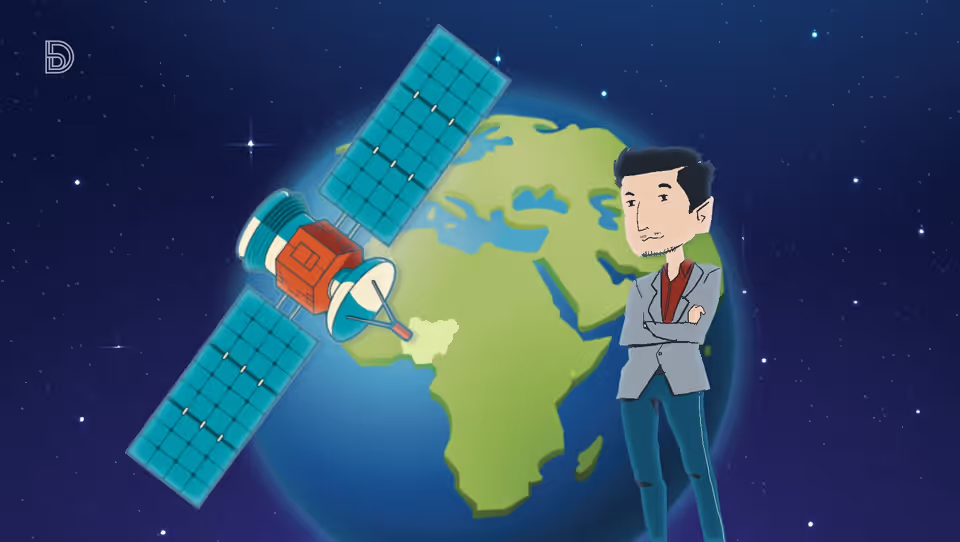SpaceX revealed plans this year to introduce Starlink’s technology in Nigeria. This comes prior to the company’s expansion across South Africa, Kenya, Ethiopia, Egypt, and many other African countries in 2022.
The presence of a renowned disruptor of markets in Africa has given itchy boils to telecommunication stakeholders, some local Internet Service Providers, and even some governments.
Yet, Starlink’s vision appears to be salvation to Africa’s unconnected areas and the last missing part of the unicorn puzzle for technology businesses in Africa. Despite the mix of emotions currently rising in telecom across Africa, little is known about Elon Musk’s ambitious Starlink project.
What is Starlink?
Founded in 2002, starlink is a satellite internet constellation launched by SpaceX to connect the world. Starlink works by beaming internet signals from satellites closer to the earth to terminals on the ground.
Starlink requires low infrastructure in providing internet accessibility. This makes it economically viable for underserved areas.
By deploying satellites closer to the earth than most telcos do (low latency), Starlink transmits signals faster to ground terminals, increasing internet speeds to as much as 150mbps. Currently, SpaceX has launched about 1443 Starlink satellites to orbit.
How Innovative is Starlink?
Existing Telcos require massive infrastructure to provide economically unsustainable communities with strong internet access. This is as a result of the high costs and associated failure rates of launching satellites into far orbit and the insane cost of providing ground terminals for underserved communities.
Summarily, people in remote communities cannot afford Telcos’ deployment of the infrastructure. Well, that was until SpaceX launched Starlink.
The Starlink advantage is its utilization of SpaceX’s achievement of significantly lowering the entry barriers and cost of launching satellites into orbit at a very low failure rate.
Besides Starlink’s low latency, this revolutionary achievement identifies SpaceX satellites from those of traditional telcos.
How does Starlink Benefit Africans?
One would easily identify that Africa is the least connected continent globally. Internet adoption across the continent as of 2019 is only about 28.2% according to the International Communications Union.
Africans are missing out on global growth opportunities such as crypto and stocks trading which could add massive economic gains to traditional economies.
Millions of Africans would receive e-health services (remote diagnosis, treatments, and health education). Widespread internet access means more freelancing jobs for talents across the continent, increased access to free and quality education, and an improved democracy.
This also means more customers for internet businesses and a wider spread of technology hubs across rural areas. Per the website, 128 users can connect to a starlink router at a time. This possibility presents huge advantages to tech communities in providing internet accessibility to startups and innovators.
By getting more people online at relatively lower costs, Starlink would add billions worth of economic gains to the entire African economy.
Will Starlink take Telcos out of Business?
To put this into perspective, let us make reference to the automobile industry. Prior to Ford motor company’s penetration of the automobile market, big players such as Opel Automobile GmbH (1862), Benz patent motor car (1865), Oldsmobile (1897), Studebaker (1852) and many others existed.
Yet, cars were luxurious, expensive, and could not be afforded by most people. Henry Ford, realizing this, significantly lowered the cost of production by mass production of vehicles through assembly lines. This lowered the cost of vehicles and made it possible for ordinary people to acquire them.
SpaceX’s Starlink can be likened to a new “Ford motor company”. They have significantly lowered the cost of deploying fast internet connection to rural areas. Whether their data bandwidth would be easily afforded by the bottom Africans, that remains unknown.
Asked about the subject, CEO of SpaceX, Elon Musk, replied “I want to be clear, it’s not like Starlink is some huge threat to telcos. I want to be super clear that it is not,” Musk said. “In fact, it will be helpful to telcos because Starlink will serve the hardest-to-serve customers that telcos otherwise have trouble doing with landlines or even with… cell towers.”
Whether this is a bait to keep telcos in line while Starlink gains its market presence also remains unknown. However, we are sure of one thing: Like any other innovations, Starlink would take some telcos out of business. Some telcos, like the Benz patent motor car (company), would still exist to serve an exclusive clientele. However, which of them remains to do so is completely unknown.
What Challenges do Starlink Face in their Pursuit of African Markets?
The success of Starlink would be determined by several factors such as affordability, regulation, and adoption. Starlink is a Telecom Satellite and would fall under the Africa Telecommunication Union (ATU).
Starlink internet costs at least $99 per month. Even in Urban Africa, this is relatively expensive for most users. Unless Starlink would guarantee 720 hours of Netflix streaming per month to rural users, the price seems exorbitant and presents challenges to SpaceX’s goal of democratizing internet access.
Domestically, some governments are competitors in the telecom industry and might pose significant regulatory charges to Starlink’s project. Some African countries are known to shut down the internet during civic unrest or protests; this censorship might pose significant challenges to Starlink’s commercialization.
Further, the company uses “phase array antennas” which simplifies the device mechanically but come at a higher cost. Considering how disenfranchised most African economies are, they might not benefit fully from Starlink’s ambitions.
Is Africa the Next Frontier for Internet Connectivity?
The benefits of getting online cannot be understated in every global economy. Recent happenings in Africa suggest that the ecosystem is prime for internet connectivity. Demand is increasing.
A study by Pew Research notes that adults younger than 30 in six sub-Saharan African countries are more likely to use the Internet, reflecting trends seen globally.
This reflects in the rapid adoption of technologies in many parts of Africa. Supply is increasing. Special products in terms of off grid renewable energy, software driven base stations, and resilience to harsh temperatures mean masts can be placed almost everywhere.
This is a great aid to Rural telecom. Recently, Huawei launched the 5G network with Rain in South Africa. At the same time, companies such as Vanu and Parallel are developing innovative solutions to connect all parts of the continent. Facebook recently announced plans to build a subsea internet cable network, 2Africa, in partnership with MTN, Orange, and Vodafone.
The rapid commercialization of Telecom innovations comes at great costs to all parties involved. However, Africa is certain to reap the benefits of the industry’s fast growing market.
Elon Musk might be a scare to many industry players but to traditional African communities, his Starlink ambition remains a glimmer of hope. SpaceX’s Starlink is providing lots of hope to rural Africa and alternative support to existing telcos.






